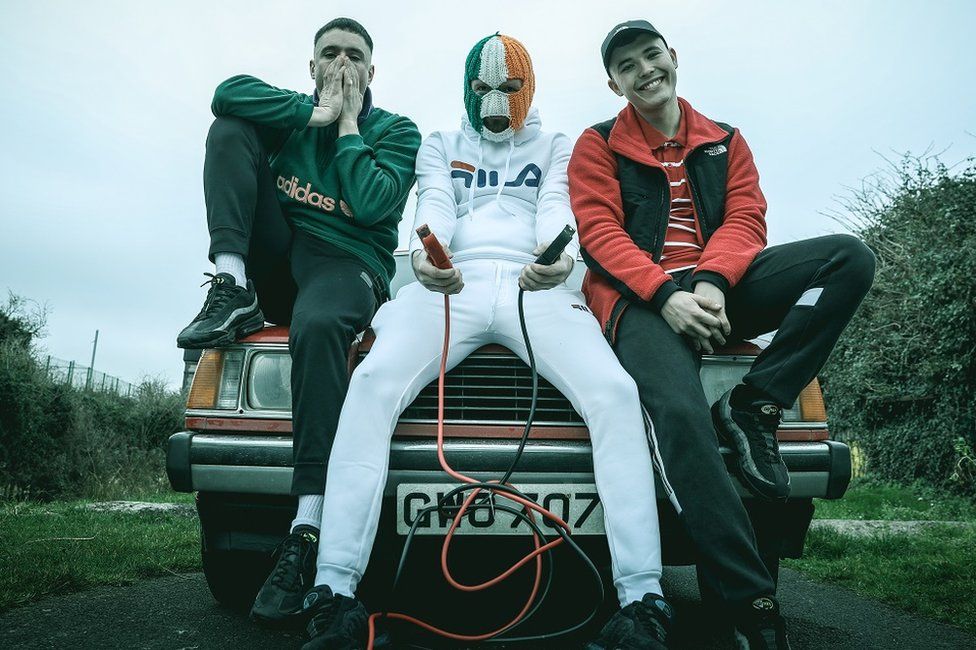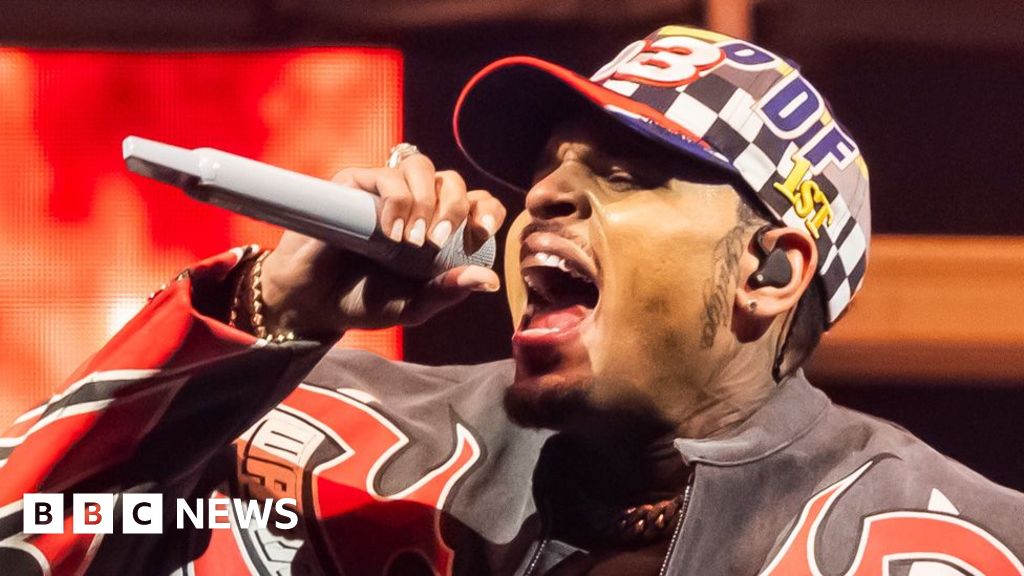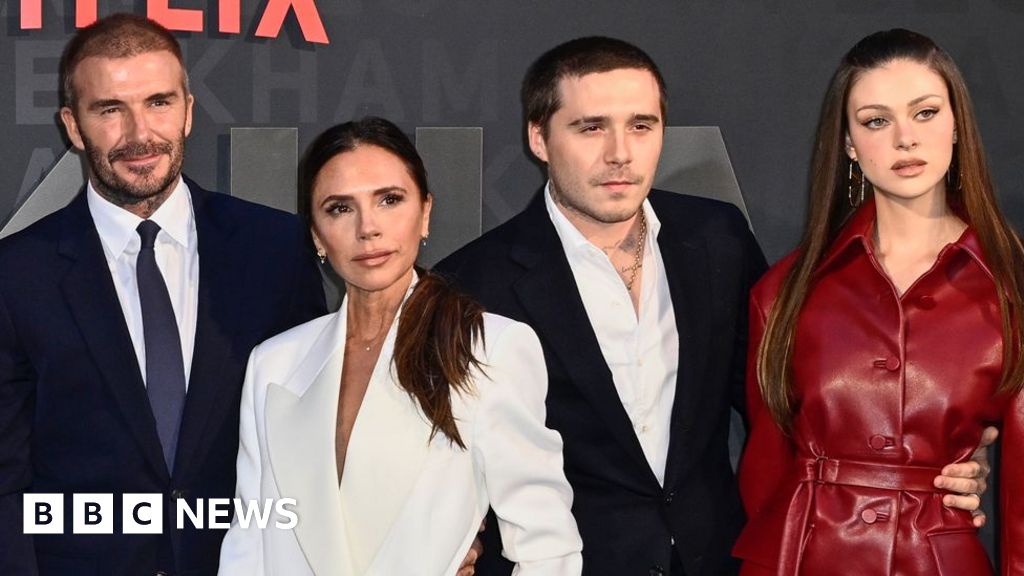ARTICLE AD BOX
 Image source, PEADAR GILL
Image source, PEADAR GILL
Mo Chara, DJ Próvaí and Móglaí Bap perform as Belfast hip-hop group Kneecap
"As far as hip-hop is concerned, you have to have some sort of controversy around you or you're not doing it right."
That's according to Mo Chara.
Materialising from west Belfast in 2017, Chara, Móglaí Bap and DJ Próvaí - also known as Kneecap - create music that is as controversial as it is creative.
The group are now set to headline Féile an Phobail in Falls Park, Belfast, on Friday night.
Their name is derived from so-called kneecapping - where young people are shot in the legs by paramilitaries in republican and loyalist communities in Northern Ireland, because of allegedly being involved in crime or anti-social activity.
Image source, Kneecap
Image caption,The group are headlining this year's west Belfast festival
Rapping primarily in the Irish language, the three-piece have faced criticism and censorship for their politically charged lyrics but that hasn't stopped them gaining a following both in Ireland and overseas.
Their debut track, C.E.A.R.T.A., was recorded after Móglaí Bap was arrested for spray-painting the word rights - cearta - in Irish. He refused to speak English to police and was held as they waited for a translator.
The expletive lyrics and drug references led to Ireland's national broadcaster blacklisting the group from the offset. It probably didn't help that RTÉ had a direct mention in the track.
"It just turned into this music video, and we didn't really have any ideas for after," Mo Chara told BBC News NI. "It went down so well we thought we'd be mad not to do another song."
'Looking inwards'
The undercurrent of all their music is the growing Irish language community among young people in Belfast, Móglaí Bap explained.
"I think in Ireland for a long time, hip-hop was looking outwards... they were performing with American accents, but there's a big change now with people using their own accents and trying to be authentic and looking inwards," he said.
"We had a big interest in hip-hop and that genre of music and there was really no representation of this growing [Irish speaking] community."
Mo Chara added: "A lot of it came from The Rubberbandits and people were able to be authentically Irish and do hip-hop without it being cringey and cheesy, talking about drive-bys. They [The Rubberbandits] could do a song about a horse without feeling like they had to emulate Americans."
Image source, Getty Images
Image caption,Kneecap performing at Electric Picnic in 2022
Kneecap's lyrics do not shy away from the group's desire for a united Ireland but they're also filled with universal, working-class lived experiences and examine identity through a lens that can be interpreted as both comedic and polarising.
Their musical tastes range from Irish republican rebel tunes to rap, with American duo Dead Prez cited as a major influence.
"They intertwined realism with absurdism and satire, and they used that as a means of expressing what they wanted to say," continued Móglaí Bap, while Mo Chara added they try to embody the same anti-authority attitude as NWA.
Image source, Kneecap
Image caption,The performers are preparing to tour the United States and Canada
The group are shaking up this year's Féile an Phobail festival in west Belfast. They'll be headlining on Friday, while folk group The Wolfe Tones play later in the weekend - a shift in sound, but Mo Chara said there are thematic similarities to be found in both groups' music.
"Rebel music in Ireland has all the same sort of ideas as hip-hop in America. A community that's oppressed, using songs to revolt in some way," he explained.
Much emphasis has been placed on Kneecap's lyrics, in that they flit between Irish and English in rapid succession, but the performers said this wasn't a conscious creative decision.
"We grew up speaking Irish as a first language... it wasn't necessarily that we chose the language because of its niche qualities," Móglaí said. "It comes naturally."
"It's actually much easier because there's twice as many sounds," Mo Chara added, explaining it provides a denser vocabulary and is reflective of how the Irish language is spoken by youths today.
'We like people to get riled up'
While the music comes easy for Kneecap, how do they deal with the backlash?
"People have an emotional reaction when we're saying things like 'get your Brits out', but when you're reading into it we're actually talking about getting the DUP [Democratic Unionist Party] for a night out."
Some people might question that sentiment - but the rappers are unfazed by the criticism.
"That's something we play up to - we like people to get riled up before they even know what they're annoyed about," Mo Chara explained.
Criticism has come from the top, with politicians weighing in on the group's output.
Image source, Liam McBurney
Image caption,A Kneecap mural unveiled during the 2022 Féile an Phobail caused upset
Last year, the Alliance Party's leader Naomi Long suggested a Kneecap mural, which depicted a burning police van, could groom young children into sectarian hatred.
DUP leader Sir Jeffrey Donaldson said the mural was "offensive to every serving police officer in Northern Ireland and to many in the wider community", while UUP leader Doug Beattie accused the group of "foster(ing) hatred" and "grooming a new generation of young people with insidious messaging".
But Móglaí argues this outrage is misplaced.
"It's the same people who are coming out trying to be outraged constantly over paintings on walls when in reality there's a lot worse things happening in the north. There's a bigger crisis happening," says Móglaí, adding that it was a different experience for young people on the streets.
He recalls an experience in the predominantly Protestant Sandy Row area of Belfast during the 12 July parades, when he overheard a group of young loyalists singing C.E.A.R.T.A.
"If they're going to jump me, they really wouldn't be singing the chorus to one of our songs, and they were sound, we had a chat... and that's the reality on the ground," he said.
"These people have respect for each other, and we drank some Buckfast. The reality with them is different.
"If [politicians] don't want to get it, we understand it - that's their own problem."
Image source, PEADAR GILL
Image caption,Political outrage has benefitted their careers, according to the group
Kneecap admit their controversies serve as great publicity as they sell out venues across Ireland, Europe and America.
The coming months will see them perform in Ireland, the US, Canada, France and Iceland.
"We don't have to rely on mainstream media to get fans. Thankfully with social media now we can build our own platforms," Móglaí explained.
That self-created platform seems to be working for the group as they recently appeared on award-winning composer Lorne Balfe's companion album for a Dungeons and Dragons film, adding to rumblings that a major record deal is in the works.
They have also expanded into the world of film-making, with a self-titled Irish language-comedy starring Michael Fassbender showcased during this year's Cannes festival.
The group, and director Rich Peppiatt, are now hoping to bring the Kneecap film to the 2024 Sundance Film Festival before a UK and Ireland cinema release next summer.

 1 year ago
39
1 year ago
39








 English (US) ·
English (US) ·